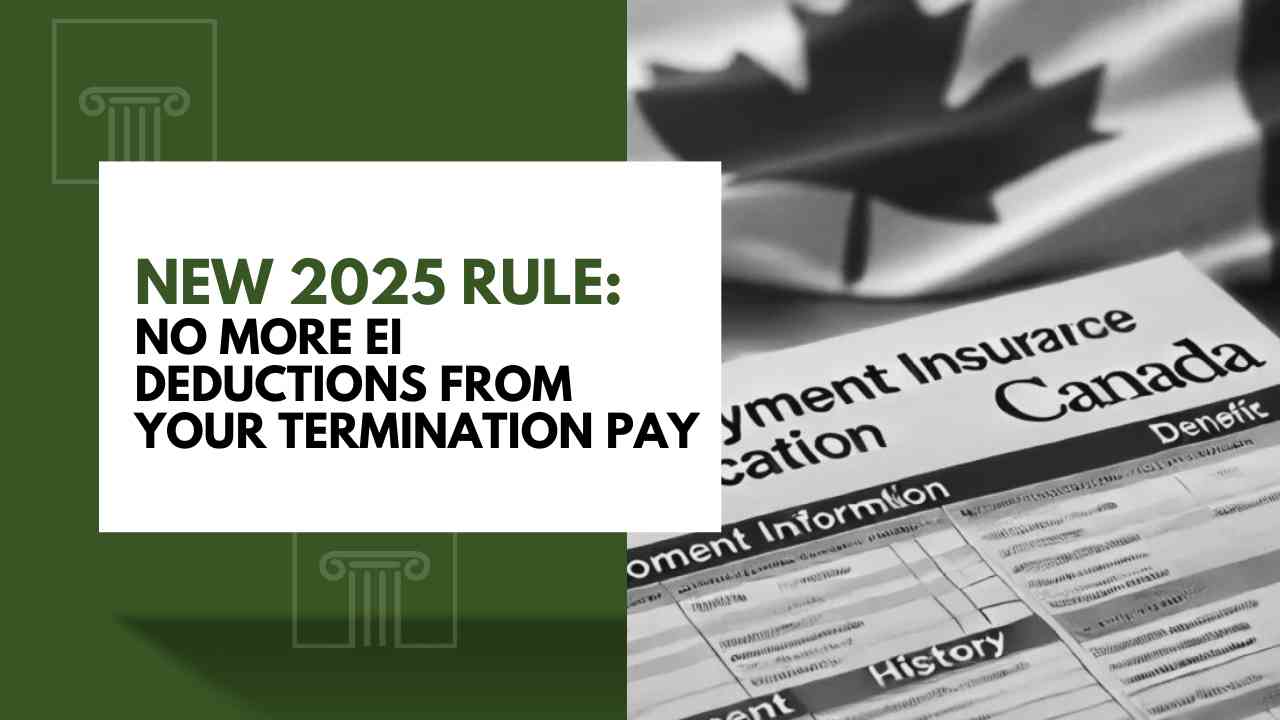
Hi! beautiful people. I`m an authtor of this blog. Read our post – stay with us

Unfairly treated or fired at work?

If you’ve recently been terminated or are facing the possibility of losing your job, there’s a new temporary rule that could significantly impact your financial situation.
The Government of Canada has introduced measures to provide relief for employees during a challenging economic period triggered by U.S. tariffs—dubbed “Trumpian tariffs”—on Canadian goods. These changes aim to support workers who may be caught in the fallout of this trade conflict.
For employees terminated between March 30, 2025, and October 11, 2025, the Government of Canada has suspended Employment Insurance (EI) repayment rules related to termination pay.
This means that if you receive termination-related payments—such as pay in lieu of notice, severance pay, or closure bonuses—these amounts will no longer count as “earnings” for EI purposes. You can keep both your EI benefits and your termination pay without worrying about deductions or repayment obligations.
This rule is not retroactive, so it only applies to terminations that occur within this specific timeframe. If your termination happened before March 30, 2025, even if you’re receiving EI benefits now, the new measures won’t apply.
The economic impact of the ongoing tariff war has put thousands of jobs at risk across industries like manufacturing and auto parts.
For employees who find themselves unexpectedly unemployed during this period, every dollar counts. The temporary rule ensures that terminated workers can retain more income while they search for new opportunities.
This measure is similar to relief provided during the pandemic when severance payments were excluded from EI calculations. It’s a lifeline for employees who might otherwise struggle to make ends meet during a turbulent time.
If you’ve been terminated—or suspect you might be—here’s what this change means for you:
• For Employees: Check whether your termination date falls within the eligibility period. If it does, you’re entitled to keep both your EI benefits and any termination-related payments. Make sure
your employer clearly outlines your severance package and termination details in writing.
• For Employers: Employers should ensure their termination letters are precise about payment types and dates to avoid confusion with EI claims. Missteps could lead to disputes or delays in
processing employee benefits.
We’ve seen firsthand how these issues can play out. For example, one client was terminated without cause but received severance pay that conflicted with their EI claim due to unclear documentation from their employer.
We successfully negotiated clarity in their severance agreement and ensured they retained their full entitlement under similar temporary measures introduced during COVID-19.
Navigating termination rules can be complex, especially when temporary changes are involved. Consulting an employment lawyer is crucial to understanding how these measures apply to your specific situation.
We specialize in wrongful dismissal claims and severance negotiations. Our team has helped countless clients secure fair compensation after job loss. If you’re unsure about your rights under this new rule—or if you suspect your employer hasn’t treated you fairly—we’re here to help. Whether it’s reviewing your severance package or advocating for your rights in court, we are committed to ensuring you thrive even during difficult times.
The temporary rule introduced by the Government of Canada offers much-needed financial relief for employees terminated between March 30 and October 11, 2025.
By allowing workers to keep both their EI benefits and termination pay, it provides stability during a period of economic uncertainty.

I’m Saad Mirza, the founder of Thrive Law, a employment law firm dedicated to helping employees across Ontario navigate challenging job terminations and workplace issues.
Copyright © 2025 All Rights Reserved By Thrive Law